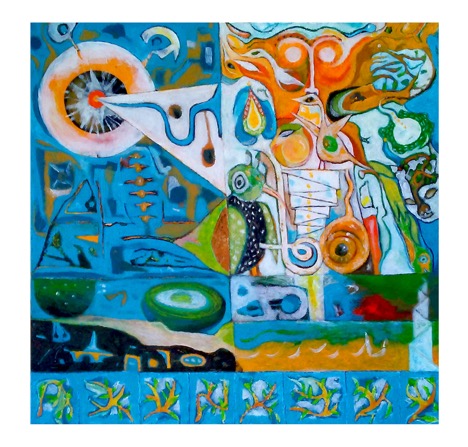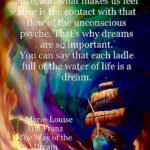More
A Mini-Course in Dreams
Dr. Jean B. Raffa

This series is based on the groundbreaking research and theories of the Swiss Psychiatrist, Dr. Carl Jung. At the beginning of the 20th century, Jung introduced humanity to the five major players in the psyche that influence the way we go through life. They star in your nightly dramas, each in their own Dream Theatre.
In this series we will begin with the player closest to your awareness and easiest to understand. From there we will progress to the deeper, more mysterious parts of your soul.
We begin with the Theatre of the Ego.
Step 1
Theatre of the Ego
Theatre of the Ego
Everyone has a conscious and an unconscious self. The theatre of the ego contains dramas about your conscious self. Your ego shows up in your dreams as you, the dreamer, the one who’s watching or participating in various activities. You are in your house trying to fix dinner for a group of people. You’re climbing a steep mountain, or walking through a dark forest or city street. You’re awakened at night by a scary noise and see an intruder. You’re driving a car or riding in a train or bus. The “you” or “I” in these dreams represents your conscious self, or ego, the part of you that decided to examine your dreams in the first place.
Everything in an ego dream shows you something real about yourself. Being more mindful of these realities as they happen can help you function better on a daily basis. For example, your dream ego’s feelings reflect your recent waking life emotions. Have you been feeling happy and free? Frustrated and stressed? Frightened or worried? To better understand the cause of these feelings, ask yourself questions like the following when you wake up: “What emotions did I feel in this dream? When did I last feel this way in waking life? What changes can I make in my waking life to feel more or less of this emotion? Know that the part of you that is asking these questions is your ego, the control center of your conscious self.
The settings, people, situations and images in your dreams and the ways you respond to them all have information about you too. Try to see their metaphoric meaning. For instance, walking through snow could mean that you’re feeling emotionally cold. How you feel about what you’re doing in your living room show you where you’re “living” right now. Being pursued by a policeman might suggest your fear of retribution for challenged some traditional belief or conventional standard. Gaining these insights can help you change in healthy ways.
Now, please enjoy this video about the Theatre of the Ego.
Step 2
Theatre of the Persona
Theatre of the Persona
From birth we are conditioned by our families and groups to behave in certain ways. As we grow, we respond to our socializing by discarding attitudes and behaviors that don’t work for us, and adopting new ones that do. In this way we (our egos) build a persona, or social mask. This is the face we show the world. Our persona may be accommodating or rebellious, comical or cynical, gregarious or aloof, sophisticated or crude. Whatever it looks like, it is not the whole story about us. Beneath it lie thoughts, attitudes, feelings, beliefs, values and interests that we withhold from the outer world for personal reasons known only to us, if at all.
The theatre of the persona contains dramas that highlight our concerns about what family, friends, classmates, audiences, classmates, authority figures or the general public think of us, and how we want to be seen by them. Dreamwork helps us distinguish the difference between what we show the world and what we withhold. Being more honest and open about our true selves makes us less defensive and deceptive. Most of all, it makes us more real, and knowing we are being real makes us feel infinitely better about ourselves.
Welcome to the theatre of the persona.
Step 3
Theatre of the Shadow
Theatre of the Shadow
While it’s fairly easy for our ego to recognize our persona, our shadow is another matter. While we were building our persona by adding things we wanted the world to see, we were also repressing and disowning the opposite qualities. Thus, if we constructed a virtuous, idealistic, humble, kind and friendly persona, we disowned our impure, weak, cowardly, arrogant, mean, critical and antisocial tendencies. We also disowned potentials that we were ridiculed, punished or shamed for having. Some of these can be the very things that would make our lives most satisfying and fulfilling if we were to develop them.
Everyone is born with the potential for every human quality, “good” and “bad.” Disowned qualities don’t go away, but sink deeper into our unconscious where unbeknown to us, the ones we dislike and fear the most grow in strength in power. Our disowned qualities are aspects of our shadow. Our “dark” shadow shows up in dreams as people, animals, and behaviors we dislike, hate, fear, or feel guilty about.
Sometimes our dream ego acts out our dark shadow’s qualities, and sometimes it helps others act them out. This doesn’t mean we would actually do these things in waking life, so we don’t need to feel guilty. We just need to realize that our dream is trying to help us accept our flaws. Although we usually think of our shadow as composed of flaws, we also have a “light” or “gold” shadow which can show up in dreams (and life) as people we like and admire. They contain potential we would do well to develop.
A major step in our psyche’s growth is to acknowledge our shadow when it shows up instead of being defensive or denying its reality. Refusing to accept our faults and flaws is a major source of dissatisfaction and dysfunction in our work and relationships. The point is not to manifest our shadow without guilt or apology; the point is to see it, admit to it, try to keep it on a leash, and know this does not mean we are a failure. It simply means we are human. A major advantage of accepting the truth about our shadow is that we become more accepting and feel more compassion for ourselves and others. When we have learned these lessons we are ready to go deeper into the last two theatres containing most mysterious and healing aspects of our psyche.
And so, let us enter the theatre of the shadow.
Step 4
Theatre of the Anima / Animus
Theatre of the Anima / Animus
This theatre contains dramas about our unconscious feminine and masculine sides. This is not about gender, but the two fundamental life forces of the soul that create and maintain balance in our psychological and physical lives.
Our feminine side, or anima, is the magnetic principle. Motivated by the drive for species-preservation, she emphasizes harmony; receptivity; feeling, shared authority; intimate relationships with ourselves, nature, and all forms of otherness; being; growing; changing; intuiting; and completing ourselves.
Our masculine side, or animus, is the dynamic principle. Motivated by our drive for self-preservation, he emphasizes logic; reason; clarity; penetrating activity; establishing our individuality and authority; creating order, organization, and structure from chaos; and idealistic striving for purity and perfection.
When our egos identify primarily with one of these fundamental forces, we are largely unconscious of its opposite. This unconscious opposite, whether anima or animus is the missing part of our soul that creates imbalance. We establish a relationship with it by accepting and developing the disowned qualities it represents. It shows up in our dreams as unusually compelling or repellant men or women. The reason they fascinate us is that they represent aspects of ourselves we have yet to activate or develop in healthy ways.
The healthy anima might appeal to our instinct for sex and bring to mind qualities like openness, deep feeling (i.e. compassion and tenderness), beauty, profound mystical feeling, wise spiritual knowing, and emotional and instinctual strength. The healthy animus might likewise appeal to our instinct for sex and attract us to qualities like physical prowess, intelligence and mental acuity, group leadership, social authority, verbal proficiency, or romantic love.
Our anima and animus are the gatekeepers to our final theatre. Only by activating the qualities they represent can we establish a lasting relationship with our truest, most sacred Self.
And now, the theatre of the Anima/Animus.
Step 5
Theatre of the Self
Theatre of the Self
The final dream theatre features the Self, the core and circumference of our psyche. Jung called the Self our God-image, or transcendent function. Also known as the “religious function,” it is the source of our awareness of the sacredness of life and our longing to connect with it.
This very real and powerful inner force has awakened and inspired every guru, shaman, sage, and Spirit Person through the ages and motivated the creation of every religion. It does so by awakening our egos with deeply moving mystical experiences, some of which come by way of dreams. Note that I said experiences, not beliefs. The Self redirects our ego’s focus away from its personal preferences, mental ideals and beliefs, and toward an awareness of the sacred Oneness of physical life and full participation in it. Once our minds are opened to this new level of consciousness, the Self gradually guides us toward fulfilling the purpose and meaning of our lives.
This inner spiritual guide is the supreme authority of the psyche. Connecting with it is the goal of inner work, and working with our dreams is one of the easiest, most effective and direct ways to achieve our goal. Having glimpsed our inner spiritual authority, we lose our need for validation of our worth from outer authorities, whether laic or religious, for we have realized that all we need dwells within us.
This does not mean that our work is done. The inner universe is as vast as the outer, and we will never know all there is to know about it, nor will we always be happy, or function from our highest and best selves. However, when our ego has a proper relationship with the Self, it loses its fear of death and trusts the benevolent processes and forces of life that led us to this infinitely satisfying place. Over time, this knowing enables us to make a work of art out of our life.
Enjoy this final video about the theatre of the Self, and thank you for participating in this mini-series about dreams. May your dreams be enlightening and empowering.
Jeanie Raffa
If you want to know more about your dreams, you can find Jean’s book, Dream Theatres of the Soul at Amazon.
Other Videos
Remyth Your Story
Soul’s Twins Trailer
Archetypal foundations of the psyche
WHY DREAMS ARE SO POWERFUL – JUNGIAN AUTHOR JEAN RAFFA
INSIDE THE PSYCHE OF WILBUR AWARD WINNER JEAN RAFFA
DYSFUNCTIONAL GOD-IMAGES IN A BROKEN WORLD BY DR. JEAN RAFFA
THE PRINCIPLES OF JEAN RAFFA – AUTHOR, LECTURER, WILBUR AWARD WINNER
MINDFUNDA INTERVIEW – JEAN RAFFA – HEALING THE SACRED DIVIDE
Audio
The Soul’s Twins song
(Composed and performed by Chad Lieberman. Mixed by Matt Saccucimorano @ Scaramanga Industries)


